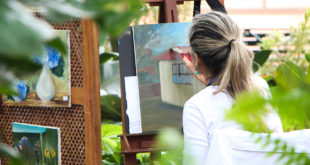It was my favorite kind of day. I could feel the heat baking into my bones. The gelato in my hand was pale orange, and it tasted of summer.
I had taken only a couple of bites when an elderly lady shuffled toward the bench and then stopped. She began to speak to me in Czech.
“I’m sorry, I don’t speak Czech,” I said. I expected that she’d either chide me or shrug her shoulders. Mostly, I expected she would continue on her way, and that would be that.
“Where did you get your ice cream cone?” she asked. Her accent was charming.
“Around the corner.” I pointed with my free hand.
“How much did it cost?” she asked.
“Twenty-five crowns,” I said. The amount was equal to a U.S. dollar.
“Oh,” she said. “So expensive.” She shuffled away, leaning heavily on a walking stick. She was a round little woman, cute and grandmotherly. Nothing was alarming about how she was dressed, nothing that suggested need. But watching her leave, I noticed that her hair had not been washed in a long time. The skin on the back of her arms was flaking.
I should have offered to buy her a gelato, I thought. Why do I think of these things so late?
The man on the next bench leaned over. “You’re American?” he asked. But I was still watching the woman. I could easily catch her, I realized.
Buying a Gelato
“Excuse me,” I said. I trotted after the woman, not sure what I would do. She hadn’t asked for money, and I didn’t want to offend her.
“Excuse me, ma’am,” I said. “Could I buy you a gelato?”
She smiled a wide and generous smile. “Yes, thank you.”
We walked together—an odd pair. Moving at her pace, I realized the shop was further than I’d indicated. I apologized, but she waved it away. She was happy, I think, to chat. She spoke five languages, she told me. Her brother had spoken 10. One of her sons was a doctor. She worked for the police, undercover. “There are lots of thieves,” she told me. “I help police catch them.” She lived, she said, in the park.
At the gelato shop, she gazed at the flavors and considered her choices. She asked the attendant several questions, and after a long pause, she finally decided on raspberry.
An Uncomfortable Situation
Every table was occupied, but in Europe, it’s normal to join someone else’s table. I asked some teenage girls if the two seats nearby were taken. They said, “No.”
As soon as we sat, I realized they’d meant: No, you can’t sit here.
I leaped out of my seat when their companions returned, but the elderly lady held her ground. She continued speaking to me as if no one else was around. She only acknowledged the others when they lit a cigarette, and then she shouted something in Czech. “I’m sorry,” I mouthed to the kids. She continued shouting.
I stood awkwardly at the table. I’d wanted to do something nice, but it’d become so complicated. “I’m sorry,” I told my companion. “I have to go.”
“But I haven’t finished my gelato,” she said.
“I have to go.” I reached into my purse and gave her enough money to buy a few meals.
“You’re so sweet,” she said.
“Oh, I’m not,” I said. “It was nice to meet you—truly.”
I wandered around Prague, poking in and out of bookshops. I couldn’t get the lady out of my head. She spoke five languages and lived on the street. Why wasn’t her son caring for her? But mostly, I blamed myself for bolting.
How many people do we pass each day? Out of those, how many of them are lonely? How often do we avoid getting involved because we’re worried about what others will think?
I obviously don’t have the answers. But I’m left thinking about the story of the good Samaritan. It’s not enough to want to help someone; it’s not enough to feel sad. Good intentions aren’t going to make another person’s life easier. We must both feel and act. Next time, I hope I make the right choice.
If you liked this, you might also like Orange Delight
Sari K. Fordham writes from Southern California.
Reprinted with permission Adventist Review, November 9, 2006.
© 2002 - 2025, AnswersForMe.org. All rights reserved. Click here for content usage information. Answers for Me Support & encouragement for every-day life
Answers for Me Support & encouragement for every-day life



